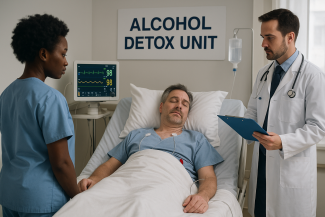Alcohol Detox in Long Island: Medically Supervised Care and the Path to Recovery

Alcohol use disorder (AUD) continues to pose significant health and societal challenges throughout New York State, including Nassau and Suffolk Counties. For individuals in Long Island, safe and structured detoxification is the critical first step in initiating recovery. Medically supervised alcohol detox helps manage acute withdrawal and reduces the risk of life-threatening complications, particularly for those with severe alcohol dependence.
Why Medically Supervised Detox Is Critical
Alcohol withdrawal can lead to serious health risks such as seizures, delirium tremens (DTs), and cardiovascular instability. According to the International Society of Substance Use Professionals (ISSUP), professional detox typically lasts 3–7 days and may involve medication-assisted treatment, hydration, and close monitoring.
Without medical oversight, withdrawal may result in complications that require emergency hospitalization. Supervised detox ensures both physical safety and a smoother transition into long-term care.
Alcohol Detox Services in Long Island
In Long Island, both hospital-based and specialized addiction centers offer detox services. These programs typically include:
- 24-hour medical monitoring and symptom management
- Pharmacological support (e.g., benzodiazepines for seizure prevention)
- Dual-diagnosis evaluation and mental health screening
- Discharge planning and referral to further care (inpatient, outpatient, IOP)
For individuals seeking flexible care, Integrity Treatment Partners offers outpatient detox and substance use treatment services in Long Island, helping clients safely manage withdrawal while maintaining their daily responsibilities.
The Detox-to-Treatment Gap
Research has shown that many individuals do not continue treatment after detoxification, increasing the likelihood of relapse. One study in the journal Alcohol and Alcoholism emphasizes the importance of continuity of care. Structured referrals, case management, and motivational interventions significantly improve post-detox engagement rates.
Without a clear transition to the next level of care, detox alone provides only temporary stabilization. Providers on Long Island are encouraged to implement warm hand-offs and coordinated care strategies to improve treatment retention.
Barriers and Recommendations
Common barriers to effective detox and post-detox care include:
- Delays in insurance authorization or lack of coverage
- Limited bed availability in inpatient programs
- Insufficient integration between detox units and long-term rehab services
To address these issues, service providers and policymakers should:
- Expand access to outpatient and residential detox programs
- Increase the use of medication-assisted treatment (e.g., naltrexone, acamprosate)
- Strengthen case management and peer navigation services
- Promote awareness of public and private insurance options, including NYSHIP coverage
Conclusion
Detoxification is an essential clinical intervention but must be paired with long-term recovery planning. On Long Island, improving the connection between detox and ongoing treatment is critical to reducing relapse, hospitalization, and mortality. Providers should focus not only on withdrawal management, but also on ensuring safe transitions into recovery-oriented services.
For more guidance, visit the ISSUP Knowledge Share platform or consult local health departments and licensed addiction service providers in New York.
References
- International Society of Substance Use Professionals (ISSUP). “Drug Rehab Long Island: Detox, Inpatient, PHP & IOP.” ISSUP.net.
- Hammarlund R, Crapanzano K, Luce L. "Review of Interventions to Improve Post-Detoxification Treatment Engagement." Alcohol and Alcoholism. 2022;57(1):136–145. Link
- Yaseen W, Zipursky J, et al. "Pharmacotherapy and Access to Treatment for Alcohol Use Disorder in the U.S." JAMA Network Open. 2024;7(3). Link
- Substance Abuse and Mental Health Services Administration (SAMHSA). “Detoxification and Substance Abuse Treatment: Treatment Improvement Protocol (TIP) Series, No. 45.” Link